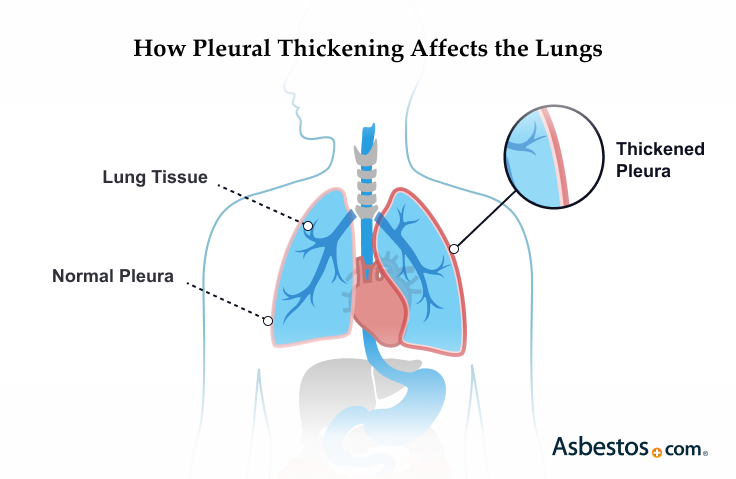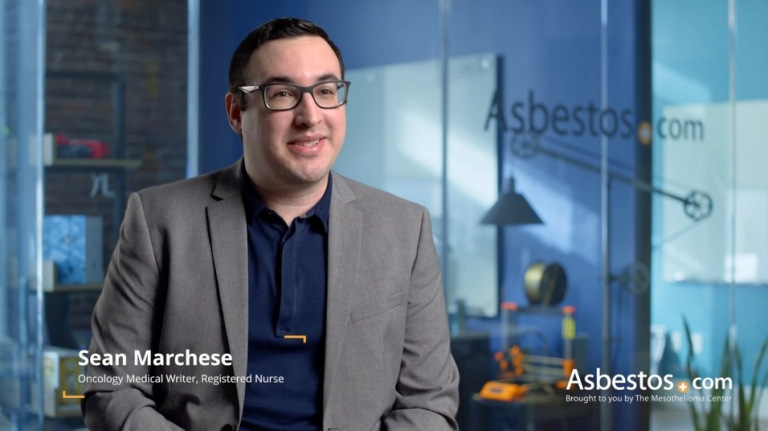Jim McWhorter was told an injury-prompted X-ray was clear, but pleural thickening was noted in his record. A later surgery found tumors. It turns out that the pleural thickening led to his pleural mesothelioma diagnosis.
Pleural Thickening and Asbestos
Pleural thickening is when scar tissue thickens the thin membrane (pleura) covering the lungs. The condition may develop because of asbestos exposure, infection or injury. Pleural thickening cannot be cured. It can also be a sign of pleural mesothelioma.
Mesothelioma and Pleural Thickening
Pleural thickening is a thickening of the pleura caused by asbestos exposure, infections or lung injuries. It can cause chest pain, shortness of breath and reduced lung function. While it’s often benign, it may signal pleural mesothelioma, requiring imaging tests for diagnosis and symptom control.
Pleural thickening can occur in different areas of the pleura. These include the parietal pleura (the lining of the thoracic cavity), the pleural space (the space between the two layers), and the visceral pleura (the layer surrounding the lungs). In most cases, pleural thickening will not affect life expectancy.
- The International Labor Office defines pleural thickening as at least 3 mm wide.
- Circumferential pleural thickening, which involves thickening around the entire pleura, is most linked to pleural mesothelioma.
- A 2023 study in the Japanese Journal of Radiology found pleural thickening in up to 92% of mesothelioma patients.
Doctors use imaging scans, like CT and MRI scans, to check for scarring and the location of the pleural thickening. These tests help doctors identify the type of pleural thickening. They can also find out if the pleural thickening may lead to mesothelioma.
Mesothelioma survivor Paul F. was first diagnosed with pleural thickening. Over 10 years later, doctors told him had pleural mesothelioma. His job at a factory likely exposed him to asbestos and led to both his pleural thickness and pleural mesothelioma.
Types of Pleural Thickening
Pleural thickening has two main types: Focal and diffuse. Within these groups, some cases can be benign, malignant or other subtypes.
- Apical Pleural Thickening: Thickening in the top portion of the pleura.
- Biapical (Bilateral Apical) Pleural Thickening: Thickening in the top portion of the pleura and both lungs.
- Nodular Pleural Thickening: Thickening makes bumps or nodules of scar tissue
The following are subtypes of diffuse pleural thickening, which can be benign or malignant.
- Benign Pleural Thickening: Noncancerous thickening of the pleura. The buildup of fibrous tissue is the main cause.
- Malignant Pleural Thickening: Large or widespread thickening that is seen on imaging scans taking up 50% or more of the left or right pleura or 25% of both pleurae. Can be a sign of pleural mesothelioma.
Pleural thickening can develop in different parts of the lung, on one side or both. Your doctor may use these terms when referring to your case.

What Causes Pleural Thickening?
Asbestos exposure is a main cause of pleural thickening. However, diseases that cause severe inflammation of the pleura or injuries can also cause pleural thickening.
Asbestos dust has microscopic fibers that lodge in the pleura when inhaled. The stuck fibers cause inflammation, leading to fibrous scar tissue buildup. This eventually can lead to pleural thickening.
- Asbestos
- Chest or rib injuries
- Coronary artery bypass grafting (CABG) surgery
- Empyema is pus in the pleural space due to infection.
- Hemothorax is blood in the pleura from chest injuries.
- Infections such as tuberculosis or chronic pneumonia
- Lung tumors (benign or malignant)
- Malignancies, including sarcoma and lymphoma
- Pleural effusion or fluid buildup in the pleura
- Pulmonary embolism or a blood clot in the lungs
- Radiation exposure
- Use of medications such as cyclophosphamide or ergotamine
It’s important to discuss your health history with your doctor, so they’re aware of your risk of pleural thickening. If you have a history of asbestos exposure, discuss it with your provider. Ask about screenings for asbestos-related diseases like mesothelioma.
A review of multiple studies published in the Journal of Occupational Medicine and Toxicology found that pleural thickening occurred in 5% to 13.5% of asbestos-exposed workers. These workers developed pleural thickening 3-34 years after their first exposure to asbestos.

What Are the Symptoms of Pleural Thickening?
The most common symptoms of pleural thickening are breathlessness, chest pain and coughing. These symptoms are like those of pleural mesothelioma. Some patients experience many other symptoms.
- Breathlessness
- Chest pain
- Coughing
- Fatigue
- Fever
- Pain when inhaling or exhaling
- Shortness of breath
The American Journal of Industrial Medicine in 2023 published a study on pleural thickening. Researchers said patients can experience “progressive decline in pulmonary function…Pleural thickening plays a role in declining vital capacity in those with prolonged or unusual [asbestos] exposures.”
How Is Pleural Thickening Diagnosed?

The most common way to diagnose pleural thickening is with imaging studies like X-rays, CT scans and MRIs. If you’re experiencing pleural thickening symptoms, talk to your doctor.
They’ll likely run diagnostic tests to rule out pleural plaques and pleural mesothelioma. It’s important that pleural thickening is quickly identified before it becomes a more serious condition or is a precursor for mesothelioma.
To help ensure an accurate diagnosis, it’s vital to share your history of possible asbestos exposure with your doctor. If you’re unsatisfied with your screening results, you can always get a second opinion on your diagnosis.
X-ray Imaging Scans
Pleural thickening is usually spotted through a chest X-ray. In fact, it’s commonly found in routine chest X-rays along the edges of the lung.
Fat along the pleura (extrapleural fat) may also look like pleural thickening, which may lead to a misdiagnosis. Because of this, X-ray images are not the most accurate. To confirm a pleural thickening diagnosis, other imaging techniques may be used.
About 50%
Percentage of pleural mesothelioma cases showing pleural thickening.
Source: Japanese Journal of Radiology, Volume 42
CT Scans
CT scans are the main way to diagnose pleural thickening. This method measures pleural thickening under 1 centimeter. It can also help diagnose early cases.
PET Scans and MRIs
Doctors can use PET and MRI scans to tell apart pleural thickening from pleural mesothelioma. CT scans are important because they can start pleural mesothelioma patients on early treatment if caught early.
Pleural Thickening Treatment
Pleural thickening has no cure. Supportive treatment is all that is available. The best options are to quit smoking, stay active and do rehab.
- Complementary Therapies: Relaxation techniques and meditation may ease symptoms such as pain.
- Exercise: People with pleural thickening may benefit from exercise that improves cardiorespiratory functions.
- Medications: Doctors may use steroids to ease breathlessness.
- Oxygen Therapy: Less severe cases may benefit from the use of inhalers.
- Pulmonary Rehabilitation: Pulmonary therapists help patients perform breathing techniques and exercises over 2-3 weeks.
- Smoking Cessation: Lung function may improve when patients stop smoking.
Severe cases of pleural thickening may benefit from surgery such as pleurectomy. People with severe breathing issues may use portable oxygen tanks.
Doctors Who Treat Pleural Thickening
Pulmonologists and pleural specialists have the expertise to diagnose and treat pleural thickening. They can recommend follow-up care and watch your condition for signs of progression.

Maywood, Illinois
Pleural Specialist | Thoracic Surgery
Expertise: Thoracic Surgery Mesothelioma Lung and Lung/Heart Transplantations Pleurectomy and Decortication Robotic Surgery
Languages: English, Tamil

Oakland, California
Pleural Specialist | Thoracic Surgery
Expertise: Pleural Mesothelioma, Lung Cancer, Cardiothoracic Surgery, Cardiac Surgery and Surgical Oncology
Languages: English

New York, New York
Pleural Specialist | Thoracic Surgery
Expertise: Pleural Mesothelioma, Pleurectomy and Decortication Surgery, Lung Cancer, VATS, Lobectomy, Thoracotomy and Clinical Research
Languages: English, Spanish

Tampa, Florida
Pleural Specialist | Thoracic Surgery
Expertise: Pleural Mesothelioma, Lung Cancer, Thoracic Diseases, Minimally Invasive Surgery, Pleurectomy and Decortication Surgery
Languages: English, Spanish, French, Arabic
If you need assistance finding a pleural specialist, our Patient Advocates at The Mesothelioma Center can match you with a top doctor near you. Our team of Patient Advocates has been helping patients find doctors since 2006.
Common Questions About Pleural Thickening
- Does pleural thickening lead to mesothelioma?
-
Pleural thickening alone is not enough to confirm that you have asbestos cancer. However, it can be a sign of significant asbestos exposure and indicate a high risk for mesothelioma. Advanced pleural thickening can cause restrictive lung disease with severe breathing difficulty.
- Can smoking cause pleural thickening?
-
Asbestos is the primary cause of pleural thickening. There are data that point to a correlation between smoking and the progression of pleural thickening. Smoking limits lung function and is proven to be a cause of other respiratory diseases, such as lung cancer.
- Can pleural thickening affect your lifespan?
-
In most cases, pleural thickening will not affect lifespan. But this condition may be a sign of a more serious underlying condition such as malignant pleural mesothelioma or other cancer. Your doctor will determine how serious your pleural thickening is with diagnostic tests.
- Have there been any asbestos lawsuits related to pleural thickening?
-
Yes, Miller v. Armstrong World Industries Inc. in 1991 was a precedent-setting court case. Raymond Miller was an insulator who used asbestos products and eventually developed pleural thickening. The Armstrong World Industries Asbestos Trust now accepts claims from individuals who experienced health effects from the company’s asbestos-containing products.
- Is pleural thickening serious?
-
Pleural thickening is not always a serious condition. But if it’s left untreated, it can advance into other, more dangerous stages such as encasement of the lung. This condition causes restrictive lung disease. Pleural thickening is also a sign of significant asbestos exposure, which is a risk factor of pleural mesothelioma.
- What is the difference between benign and malignant pleural thickening?
-
Benign pleural thickening means cancer tumors did not lead to the thickened tissue. Fibrous tissue that builds on top of itself is the cause. Meanwhile, malignant pleural thickening is caused by pleural mesothelioma or cancer that spread from another location.




